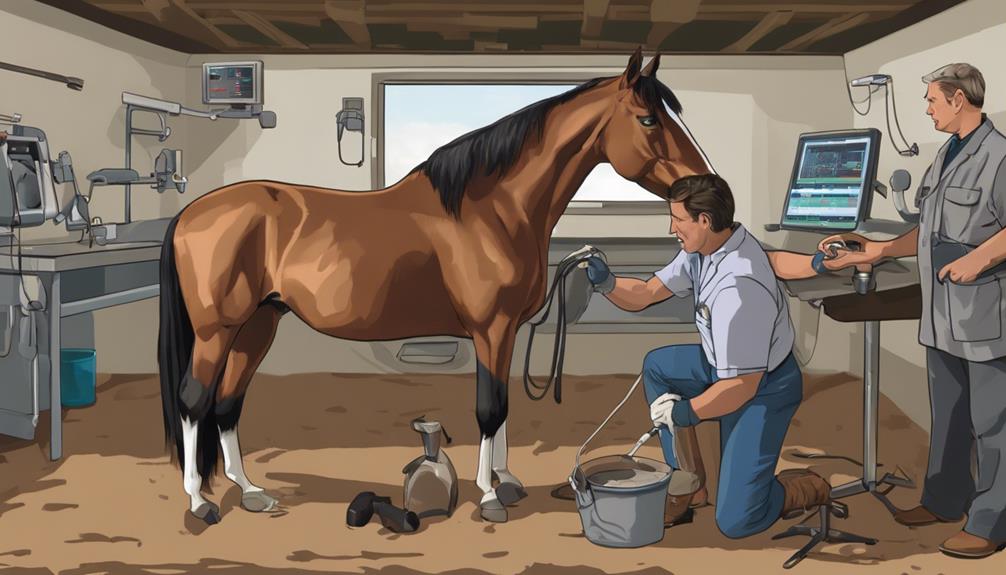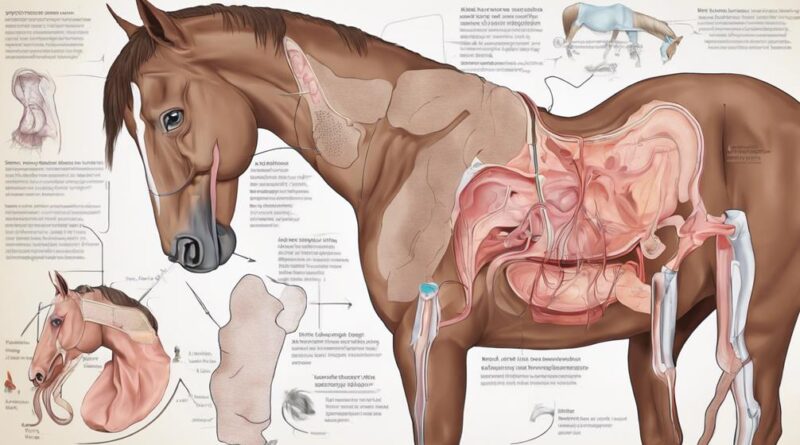Why Are Certain Equine Reproduction Issues Prevalent?
Have you ever wondered why certain equine reproduction issues seem to be everywhere?
From genetic predispositions to environmental factors, a myriad of reasons contribute to the prevalence of these challenges in the horse breeding world.
However, there is one critical aspect that often goes unnoticed, yet it plays a significant role in shaping the landscape of equine reproduction issues.
Curious to uncover this hidden piece of the puzzle?
Genetic Factors Influencing Reproduction
Genetic factors significantly impact equine reproduction success. Epigenetic modifications play a crucial role in how genes are expressed without altering the underlying DNA sequence. These modifications can be inherited, affecting the reproductive health of future generations. For example, certain epigenetic changes in genes associated with reproductive hormone regulation can lead to fertility issues in horses. Understanding these mechanisms is vital in addressing and potentially preventing heritable reproductive disorders.
Inheritance patterns also play a significant role in equine reproduction. Mutations in key genes involved in reproductive processes can be passed down from parent to offspring, impacting fertility. Identifying these genetic mutations through thorough testing and screening can help breeders make informed decisions to prevent the transmission of such issues. By recognizing and understanding the genetic basis of reproductive disorders, interventions can be implemented to improve overall breeding outcomes.
It is essential for horse breeders and veterinarians to stay informed about the genetic factors influencing equine reproduction. By staying up-to-date on the latest research in epigenetics, inheritance patterns, and mutations affecting reproductive hormone regulation, you can make more informed decisions regarding breeding practices. Utilizing this knowledge can help optimize equine fertility and contribute to healthier generations of horses in the future.
Environmental Impacts on Fertility
Understanding how the environment affects equine fertility is crucial for optimizing breeding success and ensuring the health of future generations. Climate change can have significant impacts on equine reproductive success. Extreme weather events, shifting seasons, and heat stress can disrupt breeding patterns and increase the risk of infertility in horses. Additionally, pollutants in the environment, such as pesticides, heavy metals, and industrial chemicals, can interfere with hormonal balance and reproductive functions in horses.
The breeding environment plays a vital role in equine fertility. Factors like pasture quality, stable conditions, and social interactions can influence the reproductive health of horses. Providing a stress-free and well-maintained breeding environment is essential for maximizing fertility rates and ensuring successful breeding outcomes. Monitoring environmental conditions and making necessary adjustments can help mitigate potential risks to equine fertility.
To safeguard equine reproductive success, it's crucial to address environmental challenges and promote sustainable practices. Implementing measures to reduce pollution, minimize exposure to harmful substances, and adapt to changing climatic conditions can help protect the fertility of horses. By prioritizing environmental health and creating optimal breeding environments, equine breeders can enhance reproductive success and contribute to the long-term well-being of the equine population.
Age-Related Reproductive Challenges
As horses age, they may face challenges related to reproduction that can impact their breeding success.
- Hormonal changes: Aging in horses can lead to hormonal imbalances, affecting their reproductive cycle and fertility. These hormonal changes can impact the mare's ability to conceive and carry a foal to term.
- Age-related infertility: As horses get older, they may experience age-related infertility due to decreased reproductive efficiency. The quality of both ova and sperm can decline with age, leading to difficulties in achieving successful pregnancies.
- Decline in reproductive function: With age, horses may also experience a decline in overall reproductive function. This decline can manifest in various ways, such as decreased libido, lower sperm quality in stallions, and reduced uterine health in mares.
These age-related reproductive challenges highlight the importance of considering the age of the horses involved in breeding programs. Monitoring hormonal changes, addressing age-related infertility issues, and understanding the decline in reproductive function can help in managing and overcoming these challenges to improve breeding success rates in aging horses.
Nutritional Influences on Breeding
A critical aspect to consider in optimizing breeding success in aging horses is the impact of nutritional influences on their reproductive health and fertility. Proper nutrition plays a vital role in maintaining the overall well-being of breeding horses, directly affecting their reproductive efficiency.
Dietary supplements can be beneficial in supporting the reproductive health of aging horses. Certain vitamins, minerals, and amino acids are essential for optimal reproductive function. For example, omega-3 fatty acids found in flaxseed oil can help regulate hormonal balance, while antioxidants like vitamin E protect sperm and egg cells from oxidative damage. Incorporating these supplements into the diet of aging horses can improve their reproductive efficiency.
Maintaining the ideal body condition score is also crucial for breeding success. Overweight or underweight horses may experience reproductive challenges, such as irregular estrous cycles or decreased sperm quality. A well-balanced diet tailored to meet the specific nutritional needs of breeding horses can help them achieve and maintain an optimal body condition, enhancing their chances of successful reproduction.
Stress and Reproductive Health
To optimize the reproductive health of aging horses, managing stress levels is crucial for maintaining their fertility and breeding success. Stress can lead to hormonal imbalances, affecting the mare's estrous cycle and the stallion's sperm production. Here are some key points to consider:
- Hormonal imbalances: Stress can disrupt the delicate balance of hormones involved in the reproductive process, potentially leading to issues like irregular heat cycles or decreased sperm quality.
- Anxiety: High levels of stress and anxiety in horses can have a direct impact on their fertility, making it harder for them to conceive and carry a foal to term.
- Fertility: Stress can lower the chances of successful breeding, as it can interfere with the overall reproductive health of both mares and stallions.
It is essential to create a calm and stable environment for aging horses, especially during breeding season, to minimize stress levels and optimize their reproductive health. Regular exercise, proper nutrition, and ensuring social interaction with other horses can all help in reducing stress and promoting better breeding outcomes.
Common Reproductive Disorders in Horses
Managing stress levels is crucial for maintaining the fertility and breeding success of aging horses, especially when considering common reproductive disorders in horses. Hormonal imbalances play a significant role in equine infertility. These imbalances can disrupt the estrous cycle, leading to difficulties in conceiving. Monitoring hormone levels and addressing any irregularities promptly is essential for optimizing reproductive health.
Reproductive tract infections are another prevalent issue among horses. These infections can affect both the mare and the stallion, leading to reduced fertility or even abortions. Regular veterinary check-ups, proper hygiene practices, and prompt treatment of any infections are key in preventing complications that could impact breeding success.
Abortions are a distressing concern for horse breeders. They can occur due to various reasons, including genetic abnormalities, infections, or hormonal imbalances. Understanding the potential causes of abortions and implementing preventive measures, such as vaccination protocols and biosecurity measures, are vital steps in reducing the risk of pregnancy loss.
Breeding Management Practices

Implementing effective breeding management practices is essential for optimizing reproductive success in horses. When it comes to breeding horses, certain practices can significantly impact the outcome of the breeding process.
- Proper Reproductive Timing: Ensuring that mares are bred at the optimal time during their estrous cycle is crucial for successful fertilization. Monitoring the mare's estrus behavior and using veterinary assistance to pinpoint the most fertile period can enhance breeding success rates.
- Understanding the Breeding Season: Horses are seasonal breeders, with their reproductive activity influenced by the changing seasons. Being aware of the natural breeding season of horses can help breeders plan and prepare for optimal breeding conditions. Adjusting breeding practices according to the breeding season can increase the chances of successful matings.
- Nutritional Management: Providing horses with a balanced and nutritious diet is essential for maintaining reproductive health. Proper nutrition can influence the mare's overall reproductive performance and the health of the developing fetus. Consulting with a equine nutritionist to develop a suitable diet plan can improve breeding outcomes.
Technological Advancements in Equine Reproduction
Breeding horses successfully requires staying updated on the latest technological advancements in equine reproduction. Reproductive efficiency is crucial in maximizing the chances of successful breeding outcomes. With advancements in assisted reproduction techniques, breeders now have a range of tools at their disposal to overcome various reproductive challenges that horses may face.
One key technological advancement in equine reproduction is embryo transfer. This technique allows for the transfer of embryos from a valuable mare to surrogate recipients, increasing the number of offspring a mare can produce in a breeding season. By utilizing embryo transfer, breeders can maximize the reproductive efficiency of their top-performing mares and expand their breeding programs.
Another important advancement is in vitro fertilization (IVF) in horses. IVF enables breeders to collect oocytes from mares, fertilize them with sperm in a laboratory setting, and then transfer the resulting embryos back into recipient mares. This technique has revolutionized assisted reproduction in horses, offering new possibilities for breeding valuable genetic lines and overcoming infertility issues.
Frequently Asked Questions
Can Equine Reproduction Issues Be Prevented Through Genetic Testing?
Genetic screening can help prevent certain equine reproduction issues by identifying potential hereditary diseases.
By testing for specific genetic markers, you can make informed breeding decisions to reduce the risk of passing on harmful traits to offspring.
This proactive approach allows you to selectively breed horses with lower chances of inheriting or transmitting genetic disorders, ultimately contributing to healthier equine populations.
How Do Different Climates Affect Horse Fertility?
In different climates, the environment can have a significant impact on horse fertility. Factors like temperature, humidity, and seasonal changes can affect breeding success.
It's crucial to consider how these environmental conditions may influence the reproductive abilities of horses. By understanding and adapting to the specific climate challenges, you can help increase the chances of successful breeding and healthy offspring.
Are There Specific Age Ranges When Horses Are More Prone to Reproductive Challenges?
As a horse owner, you may notice that hormonal changes during puberty can impact your horse's reproductive health. Factors like seasonal variations and environmental conditions can also play a role. Keep an eye out for potential challenges in specific age ranges, as younger and older horses may be more prone to reproductive issues.
Regular monitoring and veterinary care can help address any concerns that arise during these critical stages of your horse's life.
What Specific Nutrients Are Essential for Optimal Breeding in Horses?
To ensure optimal breeding success in horses, it's crucial to meet their nutritional requirements. Essential nutrients like protein, vitamins, and minerals play a key role in reproductive health. Properly balanced diets can enhance fertility and support overall breeding performance.
How Does Stress Impact the Reproductive Health of Horses?
When stress affects your horse, it messes with their hormone regulation, impacting reproductive health. By managing stress, you can create a better breeding environment and improve fertility factors.
Stress has a direct link to how well your horse can reproduce, so keeping your horse calm and content is crucial for successful breeding outcomes. Remember, a relaxed horse is a healthier horse when it comes to reproduction.
Conclusion
So, now you know why certain equine reproduction issues are prevalent.
Genetic factors, environmental impacts, age-related challenges, nutrition, stress, common disorders, breeding management, and technological advancements all play a role in the reproductive health of horses.
By understanding these factors, you can work towards improving the reproductive success of your equine companions.
Keep learning and implementing best practices for optimal breeding outcomes!
